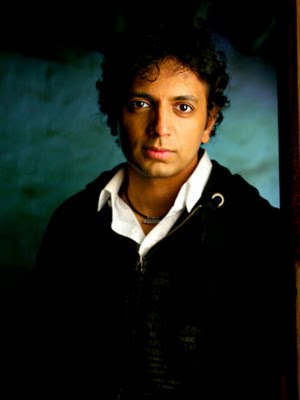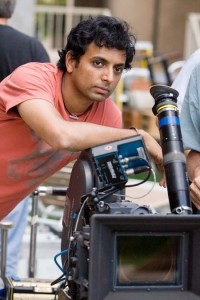 Birth name: Manoj Nelliyattu Shyamalan
Birth name: Manoj Nelliyattu Shyamalan
Mini Biography
Born in India but raised in posh suburban Penn Valley area of Philadelphia, the son of two doctors. Had a very early passion for filmmaking when given a Super-8 camera by age 8, modeling his career, even at that young age, to hero Steven Spielberg. His first film, ‘Praying with Anger’ was based somewhat on his own trip back to visit the India of his birth. This critical success was achieved as Shyamalan raised all the necessary funds in this project which he starred in, directed, produced. “Wide Awake.” the second film which he wrote and directed, was actually shot in the Phila.-area Catholic school he once attended, which his parents sent him to for its strict discipline, even though they had raised him in a different religion.
IMDb mini-biography by <[email protected]>
Spouse: Bhavna (1993 – present)
Children: 2
Trade mark
- Frequently uses Philadelphia as the backdrop in his movies. As seen in the films Wide Awake (1998), The Sixth Sense (1999), Unbreakable (2000), Signs (2002) and The Village (2004).
- Frequently uses shots of people’s reflections in various objects.
- Many of his films involve two ordinary individuals with extraordinary abilities or events happening to them. One of the people either has connections to a child or is a child, and the one connected to the child is always having marital difficulties.
- Frequently uses fluttering curtains, such as when Bruce Willis discovers the victimized mother in “Unbreakable,” and in the last shot of “Signs.”
- Films often use an event from the main character’s past as a major connection to what is happening in the present (the Vincent Gray case in “The Sixth Sense”, the car crash in “Unbreakable”, the death of the wife in “Signs”)
- Makes cameo appearances in his own movies, like Alfred Hitchcock, one of Shyamalan’s favorite directors
- Frequently uses water as a sign of death or weakness (the aliens in Signs and David Dunn in Unbreakable both have the same weakness; in The Sixth Sense, Malcolm Crowe’s killer is hiding in a bathroom. In The Village, Finton becomes too scared to continue on with Ivy when it is raining.).
- Car crashes play pivotal roles in all his films: Cole reveals his gift to his mother during a traffic jam in The Sixth Sense, David “loses” his football abilities in a car accident in Unbreakable, and Graham’s wife dies in a bizarre car accident in Signs.
- Many of his films has an important scene set in a basement. Sixth Sense: Malcolm is in the basement when discovering important plot information; Unbreakable: David discovers his strength in a basement; Signs: The family is in the basement when the aliens attack.
- His films tend to be religiously themed.
- Lengthy, uncut, immovable shot of two people talking. Usually the two characters are standing a distance from the camera.
Trivia
- Episcopal Academy, the private school in Lower Merion, PA (one of the wealthiest suburbs in the U.S., and home at one time or another to the likes of Kobe Bryant and Blythe Danner, among others) where Shyamalan was sent, is actually a private academy that is affiliated with the Episcopalian Church.
- Shyamalan lives in Wayne, Pennsylvania, part of the affluent “Main Line” suburban region of Philadelphia that includes communities like Lower Merion, Upper Merion, Bala Cynwyd, Ardmore, Bryn Mawr, and Villanova.
- His parents, wife and 9 other family members are MDs and/or Ph.Ds Completed 45 homemade movies by age 17. Graduate of Waldron and Episcopal academies; NYU(1992) Tisch School of the Arts. Wide Awake(1998) was one of the year’s lowest-grossing, least-profitable films; in contrast, Sixth Sense, The was 1999’s No.2 box-office phenomenon, surpassed only by Star Wars I.
- Name pronounced “SHAH-ma-lawn”.
- His middle name “Night” was made up during college.
- Aside from “Wide Awake”, Shyamalan has a credited appearance in each of the feature films he has directed.
- One of the first scripts he sold was called “Labor of Love” about a man who walks across country to prove his love for his recently deceased wife. As of March 2001, it has still not been made.
- Graduated from New York University.
- He is an avid comic book fan, which was made apparent in his film Unbreakable (2000).
- Recipient of Episcopal Academy’s 2001 Distinguished Alumni Award.
- 1988 Graduate of Episcopal Academy.
- The silver charm worn around his neck was given to him by his father and contains Sanskrit proverbs to keep him safe.
- Became the highest paid screenwriter in Hollywood when Disney gave him $5 million to write Signs (2002).
- Son of Jayalakshmi Shyamalan and Nelliate C. Shyamalan
- Said in the bonus disk that the movie Unbreakable was made from what started as only the first third of the original script. He said he felt no connection to the last two thirds of the text and decided to discard them.
- Ranked #21 in Premiere’s 2003 annual Power 100 List. Had ranked #64 in 2002.
- Ranked #23 in Premiere’s 2004 annual Power 100 List. He was the 5th-highest ranked director. Had ranked #21 in 2003.
- Favorite film of all time is Francis Ford Coppola’s “The Godfather.”
- His three supernatural thrillers, ‘Sixth Sense, The’, ‘Unbreakable’, and ‘Signs’, grossed over $1.3 billion worldwide.
- Has in his office posters from 3 of his most favorite movies: “Raiders of the Lost Ark”, “The Exorcist” and “Die Hard”.
- Made many films using a video camera when he was young. When his theatrical films go to DVD, he puts in a scene from one of his childhood films that marks his first attempt at the same kind of movie. The Sixth Sense includes the ghost story Nightmare on Old Gulf, Unbreakable includes the action movie Millionaire, and Signs includes the monster movie Pictures.
- His inspiration for The Sixth Sense was based on an episode from “Are you Afraid of the Dark?”
- I play for a living…Success is tied to a feeling of magic, which I can protect.
- My hope is we broke so many rules we created a new rule.
- The idea is to always go for the thing that’s risky. I want to be courageous and original. And original means, you don’t know what ‘color’ movie you just saw.
- Movie making is not like other art forms, like painting, or writing a novel, because that can be digested or interpreted… It takes two years to make each one of these, and it’s always judged on money.
- “All of my movies have made money, and that’s important for me – it’s my job to make money for the studio…”
- That’s the way stories come to me, they come to me very naturally like that. If this was a story about me and someone else, I would be withholding information about them immediately. The negative thing about the twist is that it’s all people are occupied with; all the gentleness in the movie is being overshadowed by the flashy cousin in the sequined vest taking center-stage. [on surprise endings]
- When you say fear of the unknown, that is the definition of fear; fear is the unknown, fear is what you do not know, and it’s genetically within us so that that we feel safe. We feel scared of the woods because we’re not familiar with it, and that keeps you safe.
- “I have this whole picture of the film in my head and then I put it all down on paper and storyboard it; showing the movie shot by shot. I like to feel that I have thought of everything before the camera starts rolling but I think that’s probably my asset and weakness as a film maker. I am giving my cast a target that I have in my mind and they are trying to hit it. It’s positive because I know exactly what I want to get out of my actors and the scene. But the negative is that I might not catch the lightning in the bottle, I may not get that unexpected improvised brilliance.”
- “I think I take what you might call a B-movie story, deal with B-movie subjects, and I treat it as if it’s an A-movie in terms of my approach, my crew, my actors, my ethics and so on. I guess that’s my trademark or one of them anyway!”


Be the first to comment